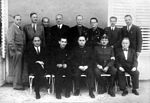Fidél Pálffy
| Count Fidél Pálffy | |
|---|---|

Ministers of the Arrow Cross Party government. Fidél Pálffy is in the second from left of the upper row.
|
|
| Born |
Fidél Pálffy de Erdőd 6 May 1895 Szentgyörgy (Svätý Jur), Kingdom of Hungary, Austria-Hungary |
| Died | 2 March 1946 (aged 50) Budapest |
| Cause of death | Executed |
| Citizenship | Hungarian |
| Known for | Politician and nobleman |
| Title | Minister of Agriculture |
| Political party |
Hungarian National Socialist Party Arrow Cross Party |
Hungarian National Socialist Party
Count Fidél Pálffy de Erdőd (6 May 1895, Szentgyörgy/Svätý Jur – 2 March 1946, Budapest) was a Hungarian nobleman who emerged as a leading supporter of Nazism in Hungary.
After service in the First World War he lived on an estate in Czechoslovakia before returning to Hungary, where he was left bankrupt by the Great Depression of 1929.
He founded a group called the Hungarian National Socialist Party in 1933 and later merged it with two similar groups under Sándor Festetics and Zoltán Meskó. By 1935 Pálffy had assumed sole control of this group, although it failed to prosper as support drifted to Gyula Gömbös. Devoid of influence, Pálffy turned to Germany and became an agent of the RSHA. Seeking to regain the initiative he worked variously with László Baky and Ferenc Szálasi in an attempt to launch a pro-German party. He finally achieved this goal in 1941 by relaunching the Hungarian National Socialist Party with Baky, although the party was considered conservative when compared to the Arrow Cross Party.
Pálffy was considered to be a suitable candidate to lead Hungary by the SS, although ultimately the choice was not approved. He also became an important contact for Wilhelm Höttl during his work on behalf of the SS in Budapest. Ultimately, as Minister of Agriculture during the period of Nazi dominance, Pálffy was held to be guilty of collaboration and was hanged for treason in March 1946. His execution did prove somewhat controversial however because, beyond his pro-Nazi writings and his membership in Szálasi's government, there was little evidence of any crimes he had committed. Nonetheless, Pálffy was one of the first members of the government to face trial. The novelty of the case, as well as his status as a member of one of the country's leading noble families, counted against him and he was sent to the gallows.
...
Wikipedia
